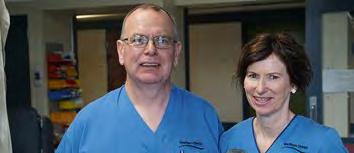
6 minute read
Collaborative research upskills surgical Trainees
Dr Nagendra Dudi-Venkata, University of Adelaide, commented: “Our research reveals the collateral impact of lockdowns on patients awaiting cancer surgery during the pandemic. While lockdowns are critical to saving lives and reducing the spread of the virus, ensuring capacity for safe elective cancer surgery should be part of every country’s plan to ensure continued health across the whole population. “In order to prevent further harm during current and future lockdowns, we must make the systems around elective surgery more resilient – protecting elective surgery beds and operating theatre space, and properly resourcing ‘surge’ capacity for periods of high demand on the hospital, whether that is COVID, the flu or other public health emergencies.” Co-lead author and Royal Australasian College of Surgeons Fellow, Associate Professor Tarik Sammour, from the University of Adelaide, added: “The most vulnerable patients to lockdown effects were those in lower income countries, where capacity issues that were present before the pandemic were worsened during lockdown restrictions. Patients in these environments were at highest risk of cancellation, despite being younger and having fewer co-morbidities. “While we only followed patients that underwent a delay for a short period of time, evidence from other research suggests that these patients may be at higher risk of recurrence. To help mitigate against this, surgeons and cancer doctors should consider closer follow-up for patients that were subject to delays before surgery.” Researchers analysed data from adult patients suffering from cancer types including colorectal, oesophageal, gastric, head and neck, thoracic, liver, pancreatic, prostate, bladder, renal, gynaecological, breast, soft-tissue sarcoma, bony sarcoma, and intracranial malignancies. The team believes that this data can help inform governments when making decisions about whether to prolong or reduce restrictions.
Country-level lockdowns have a direct impact on hospital procedures and planning, as health systems change to reflect stringent government policies restricting movement. They found that full and moderate lockdowns independently increased the likelihood of non-operation after adjustment for local COVID-19 case notification rates. Royal Australasian College of Surgeons’ Professor David Watson said he welcomed this latest in a series of high-quality, high-impact research outputs from the NIHR-funded COVIDSurg Collaborative. “We are proud of how our Clinical Trials Network of Australia and New Zealand swiftly joined this collaborative and adapted to help colleagues around the world study the impacts of the global COVID-19 pandemic. These findings will help build the evidence base for how surgical services can ‘build back better’ and, working with the World Health Organization and national coordinating bodies including the Royal Australasian College of Surgeons, develop guidance for global surgery.”
Advertisement
Aotearoa New Zealand Trainee-led study finds patient age and Māori ethnicity significantly associated with re-presentation to hospital following thoracic trauma
The student- and Trainee-led collaborative research model is an effective strategy to efficiently run multicentre studies while meaningfully upskilling Trainees. The benefits of collaborative research include decreased research waste and the inclusion of a larger number of patients in less time. This can permit greater generalisability and improve the impact of studies, while fostering a network of like-minded researchers.
Multiple Trainee-led collaborative networks have been developed across Aotearoa New Zealand (AoNZ) and Australia. Trainee-led networks benefit from medical students being taught practical research skills by senior registrars, which promotes future engagement in research. It gives Trainees the opportunity to learn skills that include data collection, data analysis, research ethics, manuscript writing, publishing, and leadership. The first AoNZ trainee-led collaborative research network, Surgical Trainees Research Audit and Trials Aotearoa (STRATA) was founded in 2018. It followed the success of medical students and trainees in AoNZ contributing to international collaborative studies. The creation of STRATA was supported by the RACS Clinical Trials Network Australia and New Zealand (CTANZ) and Northland District Health Board (NDHB), AoNZ. The first STRATA study, RURAL, was successfully coordinated between 2019 and 2020. The second study, RiBZ (Rib Fractures in Blunt Thoracic Trauma: New Zealand Management and Outcomes), was completed in mid-2021. The third study, CHOLENZ, is actively collecting data across 16 AoNZ hospitals and has recruited more than 700 patients who have had a cholecystectomy. The RiBZ study is a national prospective multicentre observational cohort

study supported by NDHB, AoNZ and guided by Associate Professor Christopher Harmston (CTANZ Surgical Specialty Lead). Patients admitted between 1 December 2020 and 28 February 2021 with isolated thoracic trauma and radiologically proven rib fracture(s) were included. The primary outcomes of interest were the rates of pneumonia, 30-day representation and mortality. Thirty-seven collaborators across 14 AoNZ hospitals collected data on 407 patients. The mean age was 57.4 years—28 per cent were female, 15 per cent Māori and 85 per cent non-Māori. The median number of rib fractures was four. The rate of pneumonia, representation and mortality were 11 per cent, 8 per cent and 2 per cent , respectively. Logistic regression found that age at admission (OR 1.03 95 per cent CI 1.005-1.051) and Māori ethnicity (OR 2.75 95 per cent CI 1.077-7.045) were significantly associated with re-presentation to hospital. Surgical stabilisation of rib fractures was performed in 2 per cent of patients and 23 per cent of patients received a regional anaesthetic block.
This Trainee-led collaborative study describes key clinical outcomes for patients with rib fractures across AoNZ. The moderate pneumonia rate of 11 per cent is likely amendable to reduction with quality improvement initiatives. Consideration should be given to further improving and resourcing the access across AoNZ to regional analgesia and surgical stabilisation of rib fracture, given their low utilisation. Māori patients were 2.75 times more likely to re-present to hospital than non-Māori patients. This disparity has been reported across various presentations. RumballSmith et al suggested that differential treatment within the health system was a likely contributing factor to higher representation rates in Māori patients(1-3) . Priority should be given to providing equitable care for Māori patients sustaining trauma and further research is required in this area. This study was made possible by the enthusiasm and hard work of collaborators across AoNZ, the guidance of our mentors, and the support from CTANZ and NDHB. These last few years have been the start of AoNZ’s collaborative Tainee-led network journey—a journey that is just beginning.
Dr Matthew McGuinness (CTANZ Working Party Trainee Lead) on behalf of RiBZ Trainee Collaborative and STRATA
1. Rumball-Smith J, Sarfati D, Hider P,
Blakely T. Ethnic disparities in the quality of hospital care in New Zealand, as measured by 30-day rate of unplanned readmission/death. Int J Qual Health Care. 2013;25(3):248-54. 2. Robinson T, Kerse N. Medical readmissions amongst older New Zealanders: a descriptive analysis. N Z Med J. 2012;125(1367):24-34. 3. Seibt S, Gilchrist CA, Reed PW, Best EJ,
Harnden A, Camargo CA, et al. Hospital readmissions with acute infectious diseases in New Zealand children <2 years of age. BMC Pediatr. 2018;18(1):98.
IMAGE First row - Teresa Vanderboor, Maria KR Brand, Andrew D. MacCormick, Niki Kau, Rebecca Teague, Brodie Elliott, Kevin Henshall Second row - Deborah Wright, Lauren Bidois, Choo Hang Khoo, Omar Mohyieldin, Jaques Marnewick, Sean Affonso, Olivia Lengyel Third row - Top row (Left to right): Chris Harmstom, Chris Varghese, Nelson Song, Rebecca Coats, Gordon Speed and Fiona Thomas
Collaborators without photos: Pam Fitzpatrick, Carsten Stracke, Rory Miller, Claire Hitchcock, Cheyaanthan Haran, David Vernon, Harsh Singh, Zoe Clifford, Bena Law, Caroline Knudsen, Monique Mahadik, Clare Swanson, Cindy Xin Yi Ou, Grant Christey, Benjamin Nuttall, Ramanen Sugunesegran, Valerie August










